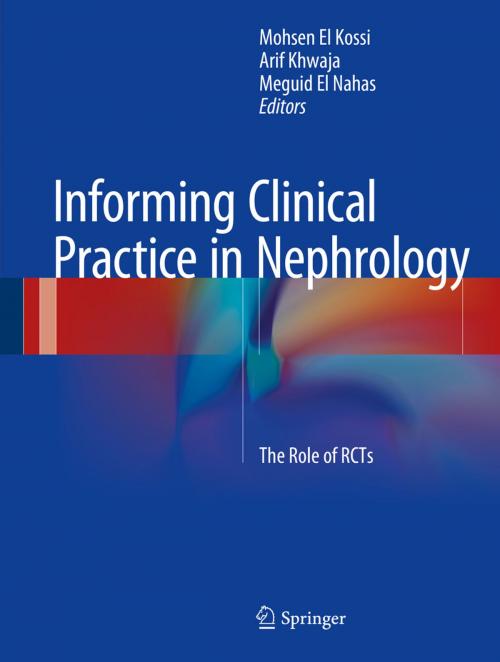Informing Clinical Practice in Nephrology
The Role of RCTs
Nonfiction, Health & Well Being, Medical, Specialties, Internal Medicine, Nephrology, Endocrinology & Metabolism| Author: | ISBN: | 9783319102924 | |
| Publisher: | Springer International Publishing | Publication: | April 1, 2015 |
| Imprint: | Springer | Language: | English |
| Author: | |
| ISBN: | 9783319102924 |
| Publisher: | Springer International Publishing |
| Publication: | April 1, 2015 |
| Imprint: | Springer |
| Language: | English |
Historically, clinical decisions in renal medicine have been challenged by the scarce availability of robust supportive evidence. Not only are the number of randomized controlled trials (RCTs) in Nephrology the third lowest amongst the medical specialties but in many instances the trials themselves are of poor quality. In addition, practice has been further influenced by extrapolation from the outcomes of general population clinical trials which exclude renal patients. The difference between the ideal trial participant and real complex cases encountered in daily practice is well recognized and further compounded in renal patients with complex pathophysiology - this ultimately makes decision making in this subset of patients a real challenge. Recently, there has been a growing interest in conducting well designed RCTs in different areas of renal medicine. However, though clinical guidelines are helpful in providing the clinicians with a frame of best available evidence for a clinical condition, it denies the unique nature of each individual patient.
This book offers a thorough and critical appraisal and evaluation of the key published clinical trials that have shaped current practice in nephrology, dialysis and transplantation. It will help the practicing physician close the gap between the inflexible and generalized nature of clinical guidelines and the day-to-day clinical decision-making for individual patients. It will provide the clinician with the tools required to investigate and extract the appropriate guidance to apply to individual cases in daily practice. Moreover, it will help improve the ability of junior colleagues to appraise available evidence in a systematic way when there is lack of local guidelines or when the guidelines are difficult to apply due to logistic constraints or barriers. Lastly, this book will serve as a reference for key clinical trials in different areas of renal medicine together with literature and authors views of these trials and their impact on changing practice.
Historically, clinical decisions in renal medicine have been challenged by the scarce availability of robust supportive evidence. Not only are the number of randomized controlled trials (RCTs) in Nephrology the third lowest amongst the medical specialties but in many instances the trials themselves are of poor quality. In addition, practice has been further influenced by extrapolation from the outcomes of general population clinical trials which exclude renal patients. The difference between the ideal trial participant and real complex cases encountered in daily practice is well recognized and further compounded in renal patients with complex pathophysiology - this ultimately makes decision making in this subset of patients a real challenge. Recently, there has been a growing interest in conducting well designed RCTs in different areas of renal medicine. However, though clinical guidelines are helpful in providing the clinicians with a frame of best available evidence for a clinical condition, it denies the unique nature of each individual patient.
This book offers a thorough and critical appraisal and evaluation of the key published clinical trials that have shaped current practice in nephrology, dialysis and transplantation. It will help the practicing physician close the gap between the inflexible and generalized nature of clinical guidelines and the day-to-day clinical decision-making for individual patients. It will provide the clinician with the tools required to investigate and extract the appropriate guidance to apply to individual cases in daily practice. Moreover, it will help improve the ability of junior colleagues to appraise available evidence in a systematic way when there is lack of local guidelines or when the guidelines are difficult to apply due to logistic constraints or barriers. Lastly, this book will serve as a reference for key clinical trials in different areas of renal medicine together with literature and authors views of these trials and their impact on changing practice.















